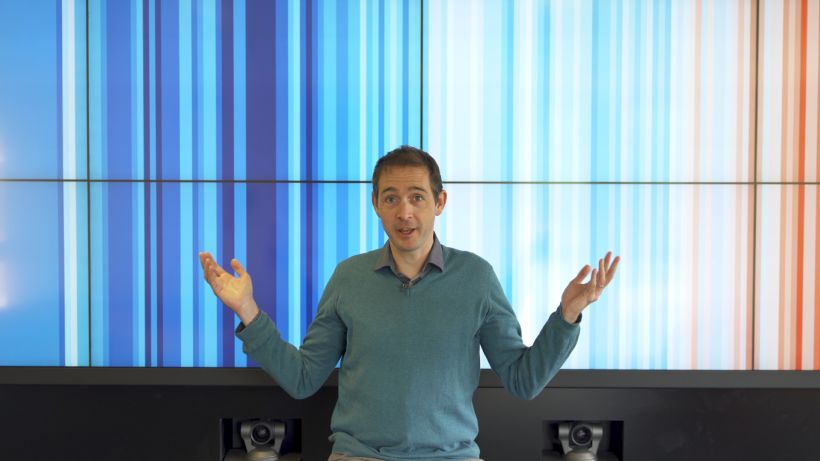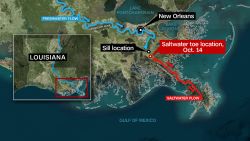Editor’s Note: John D. Sutter is a columnist for CNN Opinion who focuses on climate change and social justice. Follow him on Snapchat, Twitter and Facebook or subscribe to his email newsletter.
Story highlights
Sutter: Trump is lining up Cabinet appointees who deny or ignore basic realities of climate science
It's clear there are serious costs to doing nothing about our warming planet, Sutter says
It’s become a favorite joke of late-night comics.
“You know, sometimes I think Trump is trolling us, people,” “Daily Show” host Trevor Noah said last week. “It’s like the ultimate troll! Because you realize, every single person he’s picked for his cabinet wants to destroy the thing that they’ve been put in charge of.”
That last bit seems fair as it applies to climate change.
Donald Trump is lining up a number of Cabinet appointees who deny or ignore basic realities of climate science and whose policies could push this country – already the world’s second-biggest climate polluter – back into the dirty fossil fuel era at exactly a time when science seems to mandate the opposite.
Perhaps that’s no surprise given that the President-elect also is promoting misinformation.
“Nobody really knows’ if climate change is real, Trump told Fox News this week.
The fact remains: Climate change is real, and humans are causing it.
But you’d be more than a little confused if you listened to Trump and the folks he’s picked to head the Environmental Protection Agency, State Department and Department of Energy.
Here’s a look at their misguided – or just plain wrong – views on climate science.
An EPA head who’s suing the EPA
Donald Trump’s pick to head the Environmental Protection Agency, Scott Pruitt, does not seem to believe in environmental protection, at least as it applies to climate change.
In fact, acting as attorney general of Oklahoma, Pruitt is suing the EPA – the agency he soon could head – over Obama’s Clean Power Plan, which aims to reduce pollution deaths, clean up the air and prevent catastrophic warming. That plan is now in legal limbo. And Pruitt has described it as “an unlawful attempt to expand federal bureaucrats’ authority over states’ energy economies in order to shutter coal-fired power plants and eventually other sources of fossil-fuel generated electricity,” according to the Tulsa World. He’s tried to make this a states’ rights issue. “When the EPA exceeds the constraints placed upon the agency by Congress, the relationship is thrown out of balance and the rule of law and state sovereignty is affected adversely,” Pruitt told a Senate subcommittee last year.
There’s room for politicians to quibble over which policies are best to fight climate change, of course. But Pruitt also has a record of misrepresenting and ignoring climate science, which clearly shows we humans are warming the planet by burning fossil fuels and clearing rainforests.
“[G]lobal warming has inspired one of the major policy debates of our time,” Pruitt said this year in a Tulsa World op-ed, which was co-written by Alabama’s attorney general, Luther Strange. “That debate is far from settled. Scientists continue to disagree about the degree and extent of global warming and its connection to the actions of mankind.”
Scientists do not truly “disagree about the degree and extent of global warming and its connection to the actions of mankind.” On the first point, yes, there are reasonable disagreements about “how bad it will be and how soon its consequences will kick in,” as Robinson Meyer put it in The Atlantic. But there’s broad agreement it will be bad.
The science of climate change, meanwhile, has been settled for some time. Depending on which study you cite, between 97% and 99.9% of actively publishing climate scientists – or their studies – agree the climate is warming and humans are largely responsible. Debate the best policies to get us off of fossil fuels and onto cleaner energy, sure. But there is no debate on the science. Efforts to inject one are both misleading and dangerous.
A Secretary of State from ExxonMobil
Trump’s secretary of state pick, Rex Tillerson, is closer to the truth on his stated understanding of climate science. But it’s unclear whether he’d actually do anything about it.
This matters because Tillerson – currently the CEO of ExxonMobil, one of the world’s biggest fossil fuel companies – would represent the US in international climate change negotiations.
John Kerry, Obama’s outgoing secretary of state, negotiated the Paris Agreement, a landmark treaty aimed at limiting warming to 2 degrees Celsius. He forged new ties with China, now the biggest annual climate polluter, to help make that happen. The treaty basically sets the goal of ridding the world economy of fossil fuels this century, hopefully closer to 2050 than 2100.
Now the CEO of a fossil fuel company could take Kerry’s place in those negotiations.
Tillerson, thankfully, does acknowledge humans are causing climate change.
“I’m not disputing that increasing CO2 emissions in the atmosphere is going to have an impact. It will have a warming impact,” he said at a Council of Foreign Relations event in 2012.
In November, ExxonMobil also expressed belated support for the Paris climate accord.
But ExxonMobil knew about the dangers of climate change in the 1970s and hid that information from investors and the public, according to an eight-month investigation by InsideClimate News, a Pulitzer prize-winning news organization. (ExxonMobil says on its website that it “completely rejects the allegations made in these reports”).
And Tillerson hedges on the consequences of the warming he acknowledges fossil fuels are helping to cause. “[O]ur ability to predict, with any accuracy, what the future’s going to be is really pretty limited,” he said.
While there are uncertainties about exactly how catastrophic unchecked climate change will be – and when, exactly, certain tipping points, such as the melting of Greenland, which could raise sea levels 7 meters, will be crossed – the crisis we face is clear. Based on the best available science, we reasonably can expect submerged cities, failing crops, super droughts, deadlier storms and mass extinction in the natural world if we continue burning fossil fuels at anything near the current rate.
When it comes to planetary science, actions speak louder than words. And while Tillerson does acknowledge humanity’s role in climate change, his company continues to extract dirty fuels that are creating dangerous warming.
According to a recent report in Science, which cites the work of Richard Heede, principal of Climate Mitigation Services, ExxonMobil was responsible for 555 million metric tons of CO2 entering the atmosphere in 2013, making it the fourth-biggest polluter that year. Look at emissions from 1885 to present and you’ll see the company is responsible for 3.11% of global CO2 emissions historically, according to the research, putting it behind only Saudi Aramco and Chevron in terms of its impact.
An Energy secretary who’s said he would eliminate the Department of Energy
Last in Trump’s dirty-fuel trifecta: Energy. Trump’s team announced on Wednesday that the president-elect is nominating Rick Perry, the former Texas governor, to head the Energy Department. As a candidate for the 2012 Republican presidential nomination, Perry proposed eliminating the very department he is now tasked with leading.
“The science is not settled,” Perry said during a Republican debate in 2011. “The idea that we would put Americans’ economy at jeopardy based on scientific theory that’s not settled yet to me is just nonsense.”
I’ve addressed the not-settled point. Climate science is settled, as settled as science gets. And it’s been that way since well before Perry’s comment in 2011. (The Intergovernmental Panel on Climate Change issued a landmark report in 2007 stating that “warming of the climate system is unequivocal” and that “most of the observed increase in global average temperatures since the mid-20th century is very likely due to the observed increase in anthropogenic [greenhouse gas] concentrations.” If Perry has somehow evolved his views since 2011 he should say so.)
But the second part of Perry’s statement is also worth dissecting.
He appears to claim that doing something about climate change – abandoning fossil fuels in favor of cleaner energy, something he could help achieve if approved as the head of the US Energy Department – would somehow put the US economy in “jeopardy.” That’s surprising given that Perry is credited with bringing about a wind-power renaissance in Texas. And given the fact that doing nothing about climate change poses enormous financial risks.
The International Monetary Fund estimates 3 degrees Celsius of warming – which about is where we’re headed even with the emissions cuts pledged in the Paris Agreement – would lead to a 2% loss in global GDP. And that estimate may undersell the real economic costs.
Research published in 2015 in the journal Nature found that “unmitigated warming is expected to reshape the global economy by reducing average global incomes roughly 23% by 2100 and widening global income inequality, relative to scenarios without climate change.” That paper’s co-author, Marshall Burke, an assistant professor at Stanford University, told me US income losses are expected to be even greater: 30% to 35%.
You can also look at these costs in a more piecemeal way. In the United States in 2100, for example, unchecked warming is expected to lead to 1.2 billion hours of lost labor, valued at $110 billion; $1.1 billion to $1.6 billion in avoidable bridge damages; $2.6 billion to $3.1 billion of losses to agriculture from avoidable droughts; and $940 million to $1.4 billion in avoidable costs associated with increased wildfire response, among other costs, according to a 2015 report from the Environmental Protection Agency.
Then consider coastal flooding associated with seas that are rising as the oceans warm and ice sheets melts. A 2014 report called “Risky Business,” which was co-chaired by Michael Bloomberg, the billionaire, and Henry Paulson, former US treasury secretary, found that $238 billion to $507 billion worth of American real estate is expected to be underwater because of warming by 2100.
There’s great variability in these estimates, to be sure.
But it’s clear there are serious costs to doing nothing. And it’s clear that doing something about climate change may actually be far cheaper.
Trump and his emerging Cabinet picks don’t seem to take these risks seriously. Their stated stances on climate indicate they would push these costs into the future and, importantly, onto the backs of future generations.
They will inherit a crisis we helped create.
And they may judge this moment harshly.




















